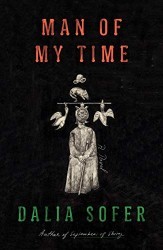Simultaneous with the overthrow of the Shah by Islamic militants, nine-year-old Shirin Amin’s life is thrown into a Kafkaesque decline, as her father Issac is jailed and tortured by Iran’s Revolutionary Guards, and her mother’s carefree and luxurious life and material trappings are both literally and figuratively torn apart. The prosperous Amin family, Jewish, yet not religious, is guilty of a crime that is unforgivable in Ayatollah-ruled Iran: they had lived a life of luxury, doing business and fraternizing with the aristocracy during the rule of the Shah, rendering them despicable and deserving of punishment in the eyes of the recently empowered Mullahs and their followers.
In The Septembers of Shiraz, Dalia Sofer has, with extraordinary skill, woven together a cast of characters replete with endearing qualities and rife with character flaws and shortcomings. It is through these characters that Sofer conveys the yearning of a people for a country that exists only in their memories of its smells, sounds, and faded photographs. Juxtaposing the experiences and reactions of the Amin family members, the reader sees the plight through the eyes of Shirin, her mother Farnaz, her imprisoned father, Issac, and her teenage brother, who has been sent to New York to study architecture. Along with the unraveling of the life of the Amin family we view the unraveling of the country of Iran.
In this powerful and timely first novel, Sofer brilliantly portrays the impact of having religious fanaticists and extremists control a country. While Sofer’s characterizations evoke great sympathy for the plight of the Amin family, she does not portray them as without fault. Indeed, as part of the privileged few under the Shah’s regime, they had enjoyed the benefits of wealth while often being oblivious to those less fortunate. Sofer’s observations about the tenous nature of our lives and our inability to anticipate our own destiny, while delivered subtly, are quite poignant.
Dalia Sofer on The Septembers of Shiraz
The most challenging thing about writing fiction is ensuring that the world you have created is engaging and cohesive, that all the narrative threads you have introduced early on are carried until the end, and that multiple layers are woven through the story without drawing attention to themselves. All of this should appear seamless to the reader.
For me writing is a release, a device through which I digest thoughts and emotions. The final product — the book — is a vessel that holds all this mishmash for me.
I find myself consistently drawn to ambiguity – in behavior, in relationships, in memory, in history, in governments, even in promises. I am also fascinated by the idea of the wheel of fortune — that life is favorable one instant and seemingly disastrous the next. I find much of my inspiration in these grey areas.
My novel is very much about loss, and everyone can relate to that on some level, regardless of age. Imprisonment is its most obvious and extreme manifestation — the man who had everything loses everything, literally overnight. But the loss is far greater than that: it’s the disappearance of a whole nation as it once was, the annihilation of a way of life. I’ve often thought of this novel as a kind of elegy to what once was.
From the Rohr Judges
Dalia Sofer’s compulsively page-turning first novel is, on the most straightforward level, an account of the travails of one Jewish family in the period after the Islamic Revolution in Iran, centered on the internment of its patriarch, the rare gem dealer Isaac Amin. But Sofer’s achievement transcends the simply political, or brutally narrative. Through its highways and byways that take us to far New York City and into the corridors of memory, the novel’s facets sparkle as brightly as the gems that lie at its heart; its hard surfaces invite us to gaze into the subtle stirrings in their depths.



